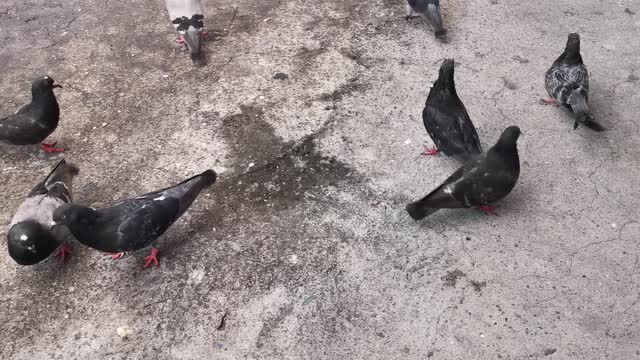Premium Only Content

Loyal Pigeons Comes to Eat Breakfast
There are above and beyond 500 types of wild pigeons and birds and in excess of 175 types of homegrown pigeons. Pigeon reproducers have created pigeons with a wide range of qualities. Some have been chosen for meat creation, some for athletic undertakings, and others for their plumage.
BREED SELECTION
The type of pigeon you select will rely upon what the pigeons are being raised for. Whatever your advantage show or execution there is a proper variety of pigeon.
Meat creation (Utility)
Normal pigeon breeds raised for meat creation incorporate white lord, red Carneau, French Mondain, and monster homers. Youthful pigeons reared for meat are called squab. Normally, squab still can't seem to fly and polish off as it were "pigeon milk," which is framed in the harvest of the guardians during agonizing. Squab are gathered only before leaving the home, ordinarily around 26 to 30 days old enough. Every squab weighs around 17.6 oz. (500 g). Ten sets of pigeons can create eight squab every month. The degree of creation can be expanded by giving a second home to each match. After eggs have brought forth, the female pigeon will lay two additional eggs in the subsequent home and hatch them while the male keeps an eye on the requirements of the two squab in the main home.
Show pigeons
There are a few types of pigeons, which come in many sizes, shapes, and tones, that can utilized to look good. A book of pigeon guidelines ought to be counseled for the particular quality of each variety. A few varieties were initially reared as utility pigeons however progressed to show pigeons throughout the long term. As a general rule, the show-type pigeon is bigger, blockier, and heavier than the utility variety from which it was first chosen. Rearing to these new norms, notwithstanding, has brought about the deficiency of specific unique qualities, like the cautious taking care of youthful and fast generation.
Fancy varieties have uncommon body compliance or striking plumage. Fantails, for instance, have outstandingly wide tails. They are not solid flyers and can't see the methodology of hunters from behind or ahead, so they ought to be bound to the space and fly pen. Essentially, Jacobins have a cause some disruption the side of the neck and a hood of plumes on the highest point of the head. These plumes dark the bird's vision every which way besides forward.
Wearing pigeons
Homing pigeons have been prepared to get back to their own lofts or enclosures when delivered. This ability can be utilized in an assortment of exercises, including conveying messages or hustling. Pigeons were utilized to convey messages even in old Greece. During the hour of the primary Olympic games, pigeons conveyed news to residents holding back to hear how their beloved competitors had done. Courier pigeons were utilized in World Wars I and II to convey messages between warriors in the field and garrisons. Many warriors owed their lives to messages conveyed by pigeons. The most well known pigeon is Cher Ami who, in World War I, flew 25 miles quickly to bring expression of the "Last Battalion." He did this with his leg broke by shrapnel and an opening in his bosom. GI Joe, one more courier pigeon, saved the existences of Allied fighters in 1943. The message he conveyed forestalled the shelling of ground that had been caught early. He arrived with the message similarly as the aircraft planes were set to take off.
All the more as of late, pigeons have been utilized in business attempts. For instance, a boating organization observed they could sell more photographs of rafters in real life if the photographs were sitting tight for the rafters when they arrived at their last objective. The picture taker would remain by the side of the waterway to take photographs, and pigeons conveyed the film in front of the rafters so that photographs were prepared when the rafters completed their ride. Homing pigeons have likewise been utilized in a wide range of functions, white pigeons (birds) specifically. Weddings and burial service are normal spots to deliver white pigeons. Disney keeps a group of white pigeons for discharge at various occasions.
Pigeon races occurred in Belgium as soon as the 1700s. Belgian workers brought this game, and the pigeons, with them to the United States. Dashing pigeons are tight-padded and exceptionally tough. Youthful dashing pigeons commonly take an interest in races of up to 300 miles, while more established pigeons can be hustled more than 500 to 1000 miles. Hustling pigeons must be prepared to fly home to their own space. Just youthful pigeons brought up in a specific space can utilized for race. More established pigeons bought from different raisers could endeavor to travel to their unique space whenever delivered.
Roller pigeons are utilized as execution birds since they turn in reverse in somersaults while falling through the air. The quicker the somersaults, the better the exhibition. Fanciers have various inclinations for the nature of a decent roller. Some favor rollers that roll with higher recurrence; others consider how profound the birds fall while turning their somersaults. Rollers are typically flown in packs, gatherings of around 20 birds. The more noteworthy the quantity of pigeons performing together, the more important the pack. A few public shows for roller fanciers are held all through the United States every year. Tumbling pigeons are like rollers, however they do their rolls on the ground since they can't fly. The record for the longest roll is north of 100 ft. These pigeons must be raised as ground birds since they can't fly up to roosts or home boxes.
There are other athletic contests for pigeon fanciers. Jumping pigeons fly to a high height and afterward plunge back to the space on order. Rushing includes sending the herd for practice and having them fly into one more fancier's run to bring back a couple of unfamiliar pigeons to the space. Stealing includes utilizing a male pigeon to allure females of an alternate fancier back to the space.
Raising pigeon
The variety you select and where you reside direct the kind of space the most ideal for your group. Prior to beginning a group, actually look at town, city, region, and additionally state guidelines in regards to pigeon creation in your space. Guidelines could confine the sort of space office you can utilize or where it tends to be situated on your property. You can utilize a current structure (old horse shelter, nursery, kid's playhouse, etc) or build another one. It is ordinarily suggested that you have 27 cubic feet of room for each pair of pigeons. It is essential to recollect that during the rearing season, the quantity of pigeons in the group will increment by two for each home. In the event that you are not collecting the youthful as squab, it is normal to keep a different space for keeping the posterity that have left the home. It is OK to leave posterity in similar space as their folks, as long as there is adequate space for the expanded number of pigeons.
Your space should meet three fundamental rules:
It ought to give security, haven, and solace for your birds.
It ought to be agreeable for you as you deal with your birds.
It ought to have adequate space for both the grown-up birds and their posterity.
Your pigeons should be shielded from the components, particularly youthful birds. The pigeon space can be exceptionally basic, yet it should have a rooftop. The space should be kept dry-pigeons can endure limits in temperature, however they should be kept dry. Pigeons kept in a moist office are in danger of creating illnesses. The space should likewise give the pigeons security from hunters like felines, canines, and rodents.
It is normal to furnish pigeons with their own "work areas" inside a space. These compartments are some of the time alluded to as roosts, however they are not the same as the roosts utilized with chickens. A straightforward plan utilizes a board 1 inch deep by 12 inches wide board separated into compartments 10 inches high by 12 inches wide. Setting a board 1 in. x 4 in. board across the base front will keep home materials, eggs, and squabs from dropping out of the home.
There are a few unique kinds of feeders and waterers accessible. It is significant, notwithstanding, that you safeguard these things from bird droppings. Give birds admittance to shower skillet on more than one occasion per week for around two hours each time. The showers should be shallow (water profundity of 2 to 3 in.) and adequately huge to oblige a few birds. Assuming the washing space is too little, the pigeons might heap onto top of one another and those on the base could suffocate or suffocate. It is vital to eliminate the shower after a brief timeframe so the birds don't drink grimy water and become wiped out.
Nourishment
You should give your pigeons feed, water, and coarseness. All are fundamental, and a lack of one can antagonistically influence the strength of the group. Similarly as with wild pigeons, homegrown pigeons feed on grains and seeds. They only sometimes eat worms, grubs, or bugs.
While buying grain for your herd, it not be new grain must (grain right out of the field) or ruined in any capacity. As of late reaped grain (under 90 days old) isn't dealt with well by pigeons. Assuming the birds are taken care of a lot of new grain, the pigeons will before long show raised a ruckus; birds will regurgitation, and others will have loose bowels. Youthful squab might pass on inside a couple of days assuming their folks are taken care of new grain. It is ideal to utilize old grain that has a low dampness content. Old grains are dry and hard, which pigeons like. Prepared grain isn't usable, in any case, assuming it has ruined. Legitimate capacity of grain is fundamental. To recognize deterioration in the grains, rub a little modest bunch between your palms and afterward smell the grains. On the off chance that they smell rotten or smelly, don't involve them as feed.
Pigeons flourish most when taken care of a wide range of grains. In spite of the fact that pigeons can get by on just a couple of grains, they will improve a blend of at least four grains. Potential grains incorporate corn, wheat, sorghum, oats, grain, rye, or rice. Buckwheat, vegetable seeds, peas, soybeans, vetch, and peanuts can likewise be utilized. Feed just as much grain as the pigeons will complete in a solitary taking care of. No grain really should be left on
-
 1:38:35
1:38:35
FreshandFit
10 hours agoDecoding Lily Phillips' Lies Through An RP Lense!
71.6K26 -
 1:39:03
1:39:03
Benny Johnson
10 hours ago🚨 Trump Live Right Now From Oval Office in First Fox News Interview as President | ‘Watch This…’
184K179 -
 2:10:04
2:10:04
Barry Cunningham
11 hours agoLIVE WATCH PARTY: PRESIDENT TRUMP INTERVIEW WITH SEAN HANNITY!
69.8K25 -
 1:37:19
1:37:19
Glenn Greenwald
14 hours agoAs Trump Vows to Restore Free Speech, Harvard Just Assaulted It; Columbia Professor Forced Out Over Israel Criticisms | SYSTEM UPDATE #394
107K204 -
 58:45
58:45
The StoneZONE with Roger Stone
11 hours agoTrump Pardons Ross Ulbricht | The StoneZONE w/ Roger Stone
80.1K17 -
 1:57:31
1:57:31
2 MIKES LIVE
20 hours ago2 MIKES LIVE #170 with special guest Rep. Buddy Carter (R-GA)
69.4K3 -
 1:02:58
1:02:58
Flyover Conservatives
1 day agoA Doctors Response to Trump’s First Moves: W.H.O. and FDA - Dr. Troy Spurrill; A REAL-LIFE Approach to Health and Wellness Transformation - Kellie Kuecha Moitt | FOC Show
135K9 -
 41:50
41:50
State of the Second Podcast
15 hours agoWhat do Gold and Guns have in common?
67.7K5 -
 1:01:26
1:01:26
PMG
11 hours ago $7.28 earnedLibs In FULL PANIC Since Trump Took Office! Creating a Faith to Fit their Agenda
48.9K10 -
 7:09:22
7:09:22
Dr Disrespect
19 hours ago🔴LIVE - DR DISRESPECT - TRIPLE THREAT CHALLENGE - EXTREME EDITION
274K39